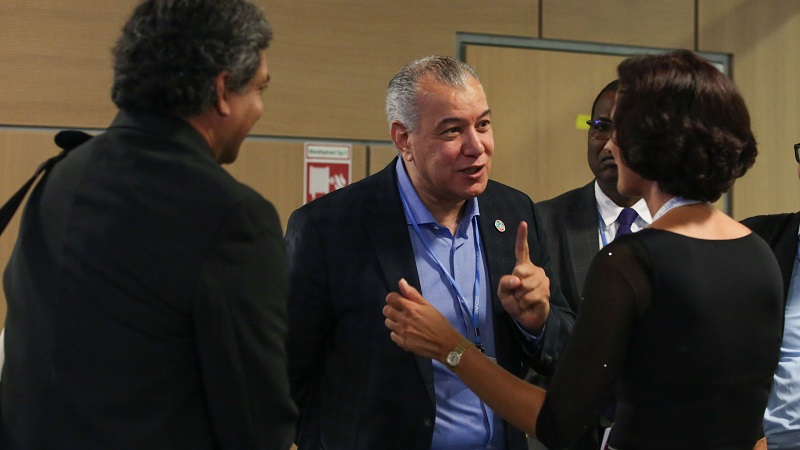Saudi Arabia’s senior climate diplomat Ayman Shasly has stepped back from his role in international negotiations.
An international policy advisor at the energy ministry and former Saudi Aramco employee, Shasly has been a prominent figure representing Saudi Arabia for years: at the UN climate talks, the Intergovernmental Panel on Climate Change (IPCC) and as a board member of the Green Climate Fund (GCF).
He served as chair of the powerful Arab group for a decade, taking on the role in January 2012.
Albara Tawfiq, an international policy advisor at the energy ministry and policy advisor at oil giant Saudi Aramco, confirmed that Shasly is not attending interim climate talks in Bonn this month. Tawfiq is chairing the Arab group’s meetings in his absence.
“We don’t have a clear direction of the chairmanship of the group,” Tawfiq told Climate Home, adding that his role as chair was “not yet officially permanent”. He added that Shasly was still working on climate issues and may return to international forums.
In March, the Asia-Pacific regional group informed the GCF secretariat that Shasly would be replaced by Tawfiq on the board with immediate effect. One source suggested this was due to health issues.
Shasly and Saudi Arabia’s energy ministry did not respond to Climate Home’s request for comment.
Shasly has played a critical role in shaping the Kingdom’s negotiation style at the UN climate talks.
One former climate diplomat described Shasly as “deliberately obstructive” and “sneaky” in pushing Saudi Arabia’s agenda in the negotiations. Others saw him as an ally in defending the principles of equity and historic responsibility.
Shasly stepping back from the process is unlikely to alter the Arab group’s and the Kingdom’s positions, but it may impact their attitude in the negotiations.
“[Tawfiq’s] style is markedly less confrontational in language, while still on target on substance,” one veteran climate observer told Climate Home.
Unusually, Arab youth activists were invited to attend the group’s coordination meeting last week. They welcomed the development and called for further chances to participate.

Albara Tawfiq at the Cop24 climate talks in Katowice, Poland, in December 2018 (Photo: IISD/ENB | Kiara Worth)
Tactics used by Saudi Arabia to block and delay international climate action have challenged the consensus-based approach of the climate negotiations – often offering cover for laggard nations less keen to make their views public.
In 2018, Saudi Arabia was one of four oil producers to block the welcoming of the IPCC’s special 1.5C report which lays out the differences between 1.5C and 2C of warming – a matter of survival for many small island states. Under Saudi pressure, discussion of the IPCC report in formal negotiations was shut down.
Discussions on the issue were so heated that civil society observers lodged a formal complaint against one Saudi negotiator for “bullying” a female co-facilitator during the talks. The name of the negotiator was never revealed.
The 1.5C target poses a threat to the Kingdom’s oil revenues, which fund fuel subsidies, free healthcare and education. While Saudi Arabia is attempting to diversify its economy, oil rents still account for around a quarter of its GDP.
“We need time” to end the use of fossil fuels, Shasly told Carbon Brief in a rare interview in 2018. “Now, that could be within the next 15, 20, 30 years. It’s just a matter of supply/demand.”
More recently, Saudi Arabia adopted a 2060 net zero target, which doesn’t include an oil exit plan, and pledged to plant 10 billion trees to combat desertification and reduce emissions.
